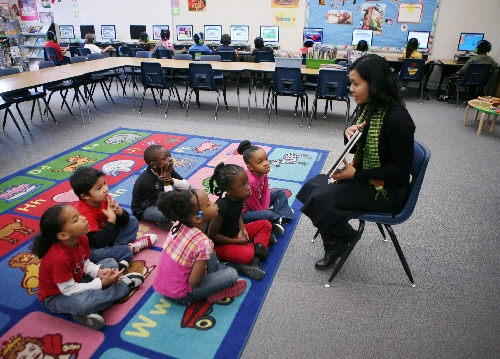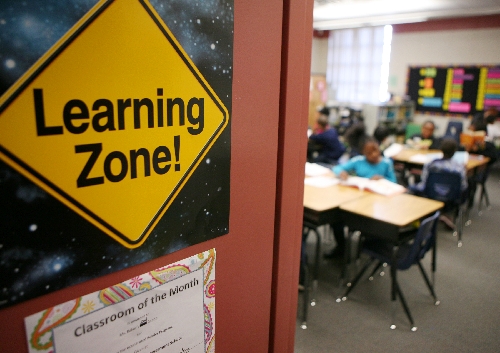Struggling school defies odds, earns national recognition




Wendell Williams Elementary School is near the eighth-most dangerous neighborhood in the country, D Street, where residents have a one- in-nine chance of becoming a crime victim within a year, according to FBI statistics.
More than 90 percent of students live in poverty.
And one out of two students won’t finish the school year at Williams because their families are constantly moving in and out of homeless shelters and transferring their children from school to school.
The math should add up to a failing school.
But Williams is defying the odds.
The school isn’t just getting by – it’s earning recognition from the U.S. Department of Education for its excellence.
Williams is a 2012 National Title I Distinguished School. Only two Title I schools per state receive the annual award for showing “significant” student improvement.
Title I schools have high rates of student poverty and receive extra federal funding because of the challenges they face. In the Clark County School District alone, 224 out of the 357 schools are Title I.
At Williams, poor students used to equal poor performance.
When Principal Brenda McKinney started in 2004, only 7 percent of students read at grade level and
8 percent were proficient in math. More than a dozen teachers left that year, “and parents would walk in wanting to physically adjust teachers,” McKinney said.
“They weren’t chiropractors either,” added Denise Georgi, who runs the school’s family center, which opened last year. Unlike other classrooms, hers is full of mothers and fathers taking parenting classes, learning English or earning their GED diploma.
“Kindergarten students are translating for their parents,” said McKinney, highlighting the problem they’re trying to fix.
The center indirectly helps children too. As parents make progress, so do students.
“Because we’re empowering parents, they can now help their children to do better,” Georgi said.
Nearly seven times as many students are now at grade level in reading and math compared with 2004.
But the family center is just part of the school’s secret.
Williams is in its fourth year as a district empowerment school, meaning the principal has autonomy over her budget, curriculum, staffing and more. McKinney extends that freedom to her teachers.
“Everybody doesn’t have to be on Page 36 on Monday,” humanities teacher Chris Lemke said. She’s encouraged to tailor her teachings to her students, who are tested every Friday. Those test results drive the following week’s lessons.
“You can’t move forward if they’re not ready to move forward, period,” fourth-grade math specialist Rasheed Malik said.
Students track their own weekly progress on classroom boards, which drives healthy competition at the school where two-thirds of students are black and almost all others are Hispanic.
“I grew up over here. People tend to stay here,” Malik said. “Not many professionals here.”
From his first day on the job, Malik realized his efforts to teach multiplication and division would be wasted if he didn’t show the value of education, what it can provide and demonstrate that “you don’t have to be like those before you.”
He showed that to students by wearing a different pair of sneakers every day of the month.
“You have to catch them at where they’re at,” he said.
And kids are into sneakers.
He tells students that he paid for them by helping friends with college papers.
Teachers at the school try to bring facets of the world to their students, many of whom haven’t traveled in a car or seen the ocean. Last week, members of the Drug Enforcement Administration came with their K-9 unit. Professionals visit in suits and ties.
“They see others’ faces, good examples, which are hard to find around here,” said Lemke, who refuses to take credit.
She and the other teachers give McKinney all of that. But McKinney gives it right back.
“You’ve brought the ocean to our kids,” she said.
Contact reporter Trevon Milliard at tmilliard@reviewjournal.com or 702-383-0279.












